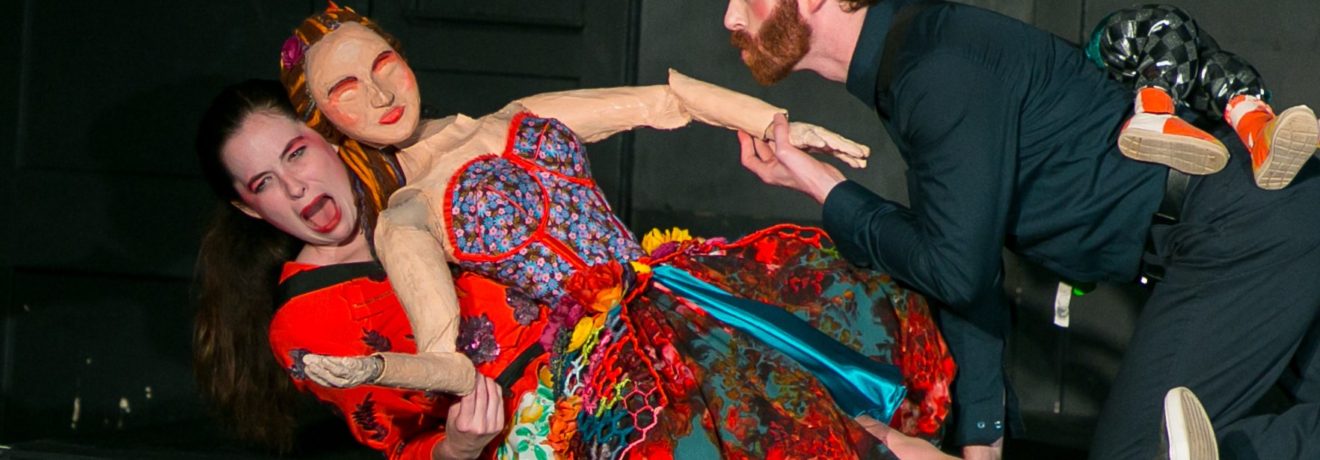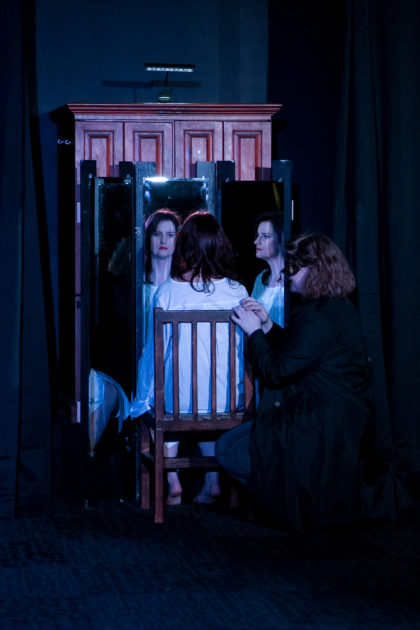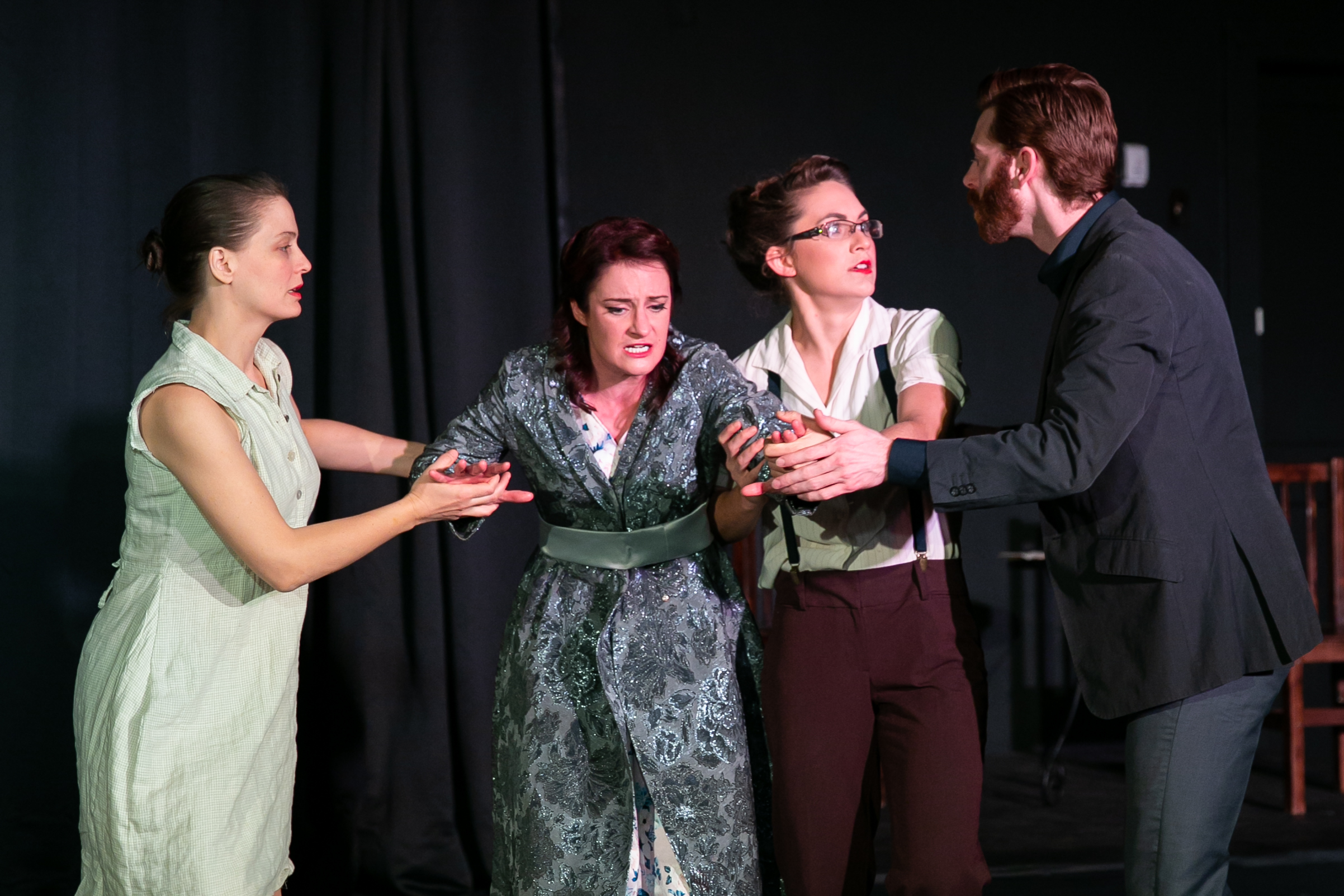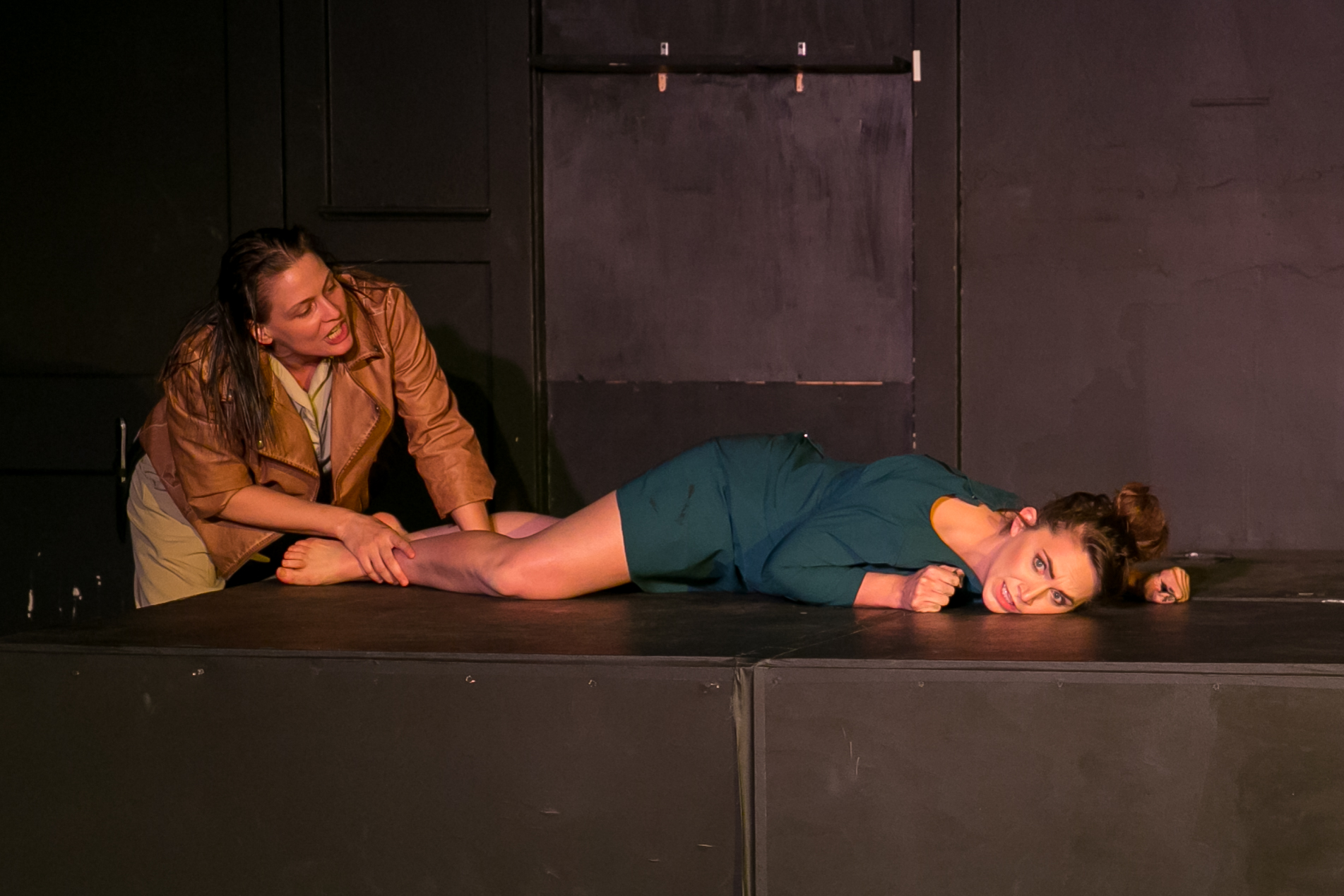Theater Reviews – 68.1
The Duchess of Malfi and The Changeling at the Brave Spirits Theatre

Brave Spirits Theatre, a classical company in Washington, D.C. committed to articulating feminist perspectives on Shakespeare’s plays and those of his contemporaries, opened their 2018-2019 season last October with two productions of lesser-performed Renaissance dramas: for a month, Middleton and Rowley’s The Changeling ran in repertory with Webster’s The Duchess of Malfi. In the wake of the Kavanaugh confirmation hearings, the company’s seemingly prescient choice to depict, side-by-side, two women brought low by the determined pursuit of the right to direct their sexual lives became an indictment of a culture that instinctively constructs female defiance as transgression. America had witnessed, in Kavanaugh’s assertion that the proceedings to discover his fitness for the Supreme Court were “a national disgrace,” an explicit reaffirmation of the implicit belief that a woman’s voice had no authority to hinder a man’s ascent; even after Dr. Ford’s testimony, it remained obvious to Kavanaugh that questioning his character besmirched the honor and integrity of the country as a whole. The spectacle on Capitol Hill found an uneasy counterpart on Brave Spirits’s stage, where the male leads similarly and with the support of their peers demanded total fidelity to their own notions of proper conduct: the nominal hero of The Changeling, Alsemero (Ben Peter), required that his new bride prove her devotion by ceasing to mourn a servant whom he had condemned as slovenly, and the Duchess’s brother Ferdinand (Ian Blackwell Rogers) declared his sister’s remarriage an insult to the purity of his blood. In both cases, a man enforced his whims by first invoking a woman’s sexual experience and then circumscribing her behavior as the only means of preserving her reputation. To these characters—as in the Kavanaugh hearings—honor came to denote an arbitrary but essential value, up to men to define but women to uphold.

In this context, the “great ruin” (Duchess V.v.110) that befell both communities onstage seemed the inevitable result of the male characters’ absolute dominion over the worlds of the plays; the productions deployed the pervasive sense of corruption and social decay that animates Jacobean revenge tragedy to consider the real cost of systemic disregard for women’s agency. Casey Kaleba’s Duchess in particular illustrated the ways that patriarchy compels women to grasp at visions of authority that soon dissipate. The Duchess—played by Katie Culligan with a verve that unified the character’s resolve to marry according to her wishes and glib disregard for the world outside her estate—wasn’t alone in miscalculating the scope of her autonomy; the adulterous nobleman’s wife, Julia (Adrianne Knapp), similarly aspired beyond her bounds. In the cutthroat world of Kaleba’s production, Julia was more than fit to wield power: at her first entrance, she casually took a gun from Ferdinand and aced a shooting drill that had flummoxed her impotent husband. But the illusoriness of that power became clear in V.ii, as she interrogated her lover, the Cardinal (Steve Lebens), about the cause of his melancholy. The Cardinal’s question “Will you rack me?” (243) initiated a BDSM fantasy: Julia wrapped herself in his cassock and coiled a whip around his body, compelling him to divulge his darkest secret. The action spoke to the psychosexual struggle at work in the scene; their sex play permitted Julia to take on her lover’s status. She became the corrupt confessor, ready to betray rather than keep his confidence. But Julia wore borrowed robes: when the Cardinal summarily murdered her by requiring her to kiss a poisoned Bible, he invoked the very authority—both religious and erotic—that she had momentarily usurped. Julia, like the Duchess, had mistaken her ability to enact her will within the private sphere; her fantasy of dominance was only a fantasy.
The production furthered the point by associating practical authority with hetero-masculinity: the other possible objects of Julia’s affection, Bosola (Rebecca Speas) and Delio (Danielle Scott), were played by female-identified actors, and pronouns in the play were altered to ensure that the characters remained legible as women. In the text, Julia’s pursuit of the servant Bosola reveals her awareness of the power dynamics at play in Webster’s Italy; she readily recognizes those who are available for her domination. But in chasing after a less potent sexual partner, she—like the Duchess—indicates the perversion of her ambitions relative to those of the society that she inhabits. Onstage, Julia’s lesbian desire similarly communicated her subjugation within Kaleba’s dystopia; her nonnormative longings betrayed her inadequacy as an authority in a world that fetishizes power. Further, by attempting to subjugate the Cardinal in service of her same-sex passion, she confirmed how radically she had misidentified her place in the hierarchy. Her companions fared no better: Bosola stormed with impotent rage throughout, only realizing the folly of having “rather sought / to appear a true servant than an honest man” (IV.ii.326-7) after she learned to loathe herself. And Delio’s final entrance, “too late” (V.v.108), was marked by a sense of her general ineffectualness. She could not woo Julia, acquire good Antonio’s land, nor, in the end, stop her friend’s accidental murder. Kaleba’s choice to reinforce the actors’ rather than the characters’ identities thus translated Webster’s critique of princely courts onto a narrative about patriarchy: his casting highlighted the gendered nature of political and social power. The Cardinal’s society instinctively victimized those who believed they could empower themselves; Kaleba’s constructed such marginalized and exploited figures as feminine.

In this way, the production effectively illustrated the ways that women are systemically abused but offered little chance for audiences to move beyond that realization. To a certain degree, this reflects the pessimism of the text: following the death of the Duchess, for example, Cariola (Musa Gurnis) frantically pleads for her life, claiming to be engaged, to have let her annual obligation to confess lapse, and to be pregnant (IV.ii.235-51). Agreeing to become whomever her murderers want, she submits to her own exploitation in the vain hope of preventing worse. The moment serves as a vivid reminder of the parts of themselves—sexuality, spirituality, bodily autonomy—that women must be willing to sacrifice for the chance to survive. In contrast, Culligan’s Duchess literally leaned into her death: she set her jaw and strained forward as the murderers pulled on the ropes that strangled her. By participating in the act, she confirmed her earlier claim to regard death at the behest of her brothers as the “Best gift…they can give, or I can take” (IV.ii.221). She appropriated her victimization to become more herself. All the same, after four acts of trying to make others recognize “I am Duchess of Malfi still” (IV.ii.139), she claimed her identity only through her willing death. There was no other way out.
Both productions, at their best, did not merely diagnose the injuries done to women; they became acts of restoration and recovery for those whose bodies and minds had been usurped and turned against them. Charlene V. Smith magnified the kind of effect produced by the Duchess’s final expression of personal identity in Kaleba’s production; her version of The Changeling continually sought to reclaim the tales told about disobedient women. The play ends with an expression of self-loathing: Beatrice Joanna (played by Scott), publicly disgraced as a murderer and adulterer, tells her father “I am that of your blood was taken from you / For your better health; look no more upon’t, / But cast it to the ground regardlessly” (V.iii.150-4). She takes up the opinion of her community and Alsemero, who deems her “all deformed” (V.iii.78), and turns herself into an “it.” In Smith’s production, however, Beatrice’s self-annihilation was not a confirmation of her identity but the result of sexual assault; when DeFlores (Gurnis) demanded Beatrice’s virginity as payment for murdering her fiancé, the scene became an increasingly excruciating and violent prelude to rape. Smith connected Beatrice’s sense of herself as inescapably polluted to the assault by covering her in fingerprints made of ashes as DeFlores pressed his hands to her arms, legs, back, and mouth. The stains remained until the end of the performance, when the cast stepped out of their roles to sit at center stage and wash the marks from her skin. The theatrical community thus rejected the narrative of “beauty changed / to ugly whoredom” (V.iii.197-8) that even Beatrice had come to accept; they erased the victim to reveal the survivor underneath. And the gender pronouns provided a clue to this final act: the male characters, though occasionally played by female-identified actors, remained male-identified. Gurnis, as DeFlores, took on the authority of the storyteller to dissect a rapist and lay him before us in all his monstrousness. The women in the cast were actors and authors of the drama, not trapped within it.

Even as the production used its dreamlike, insistently metatheatrical elements to gesture beyond social critique and enact repair, it also used such strategies to bear witness to the fracturing of identity that results from physical and emotional abuse. As DeFlores prepared to haul Beatrice offstage to her fate, her dress came to substitute for her body: she slipped out of it and watched in horror as he moved his arms inside and across its surface. Smith thus offered a vivid image of a psychological response to trauma, in which the self is preserved only by being divorced from its immediate physical circumstances. The puppet motif appeared throughout the production: the patients in the madhouse subplot wore miniature stuffed legs strapped to their chests, and Isabella (Knapp) manipulated an artificial head, torso, and arms in place of her own. Smith thus articulated a connection between madness—the loss of one’s rational self—and the lived experience of women: inhabiting a female form, at one point or another, entails severing one’s emotional and physical lives. In this vein, the madhouse scenes made much of the other major implication of puppetry: the will of the powerful was repeatedly imposed upon the puppets’ bodies. Not only did the doctors herd, beat, and choreograph the madmen, the would-be lovers Lollio (Rogers) and Antonio (Jared H. Graham) pawed Isabella’s false torso and kissed her second face against her will. So although Middleton and Rowley contrast Isabella and Beatrice—Isabella is a faithful wife despite her undesirable husband—the two became parallel in Smith’s production. Isabella’s chastity protected her from the censure and self-loathing that Beatrice suffered, but it didn’t free her from harassment, assault, and the attendant need to fragment herself. The world of Smith’s Changeling—like that of Duchess—was one in which only a semblance of the female self survived.
As contemporary reevaluations of two Renaissance tragedies, the productions succeeded in raising important questions about the price that women pay to sustain male authority. As theater, however, they occasionally lacked coherence. On the evening that I attended The Changeling, a companion with little knowledge of the play asked me to explain what was happening onstage during the madhouse scenes. And Kaleba’s props in Duchess—the whip, the gun, and the wine glasses that regularly emerged to toast new alliances—communicated the emotional content of each separate situation, but the logic that governed their local use never congealed with other elements to communicate an overall directorial vision akin to Smith’s, in which various puppets and surreal design choices worked together to expose the emotional reality of abuse. Nevertheless, The Changeling and The Duchess of Malfi again proved Brave Spirits to be an original and worthy voice in American classical theater. A GoFundMe campaign to raise money to film their Changeling, for example, spoke to the value that scholars found in the company’s unflinching investigation of the sexual assault at the heart of the tragedy. It can seem a truism to suggest that the great plays of the Renaissance grow as time passes, but Brave Spirits continues to throw itself into the difficult work of empowering that growth. Unafraid to see the plays afresh and probe the darkness at their hearts, the company preserves such dramas for—and not despite—the discomfort they continue to engender in audiences.
